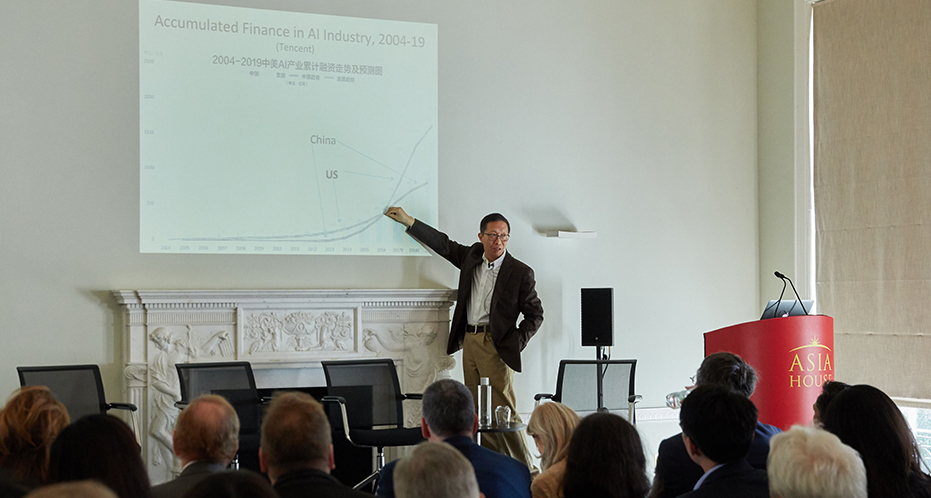Driving commercial and political engagement between Asia, the Middle East and Europe
Driving commercial and political engagement between Asia, the Middle East and Europe
Driving commercial and political engagement between Asia, the Middle East and Europe

Edward Danks, Content Producer
Within the field of Artificial intelligence (AI), China’s ambitions are clear. With plans to overtake the West by 2025 and become the global leader in AI by 2030, this fast-moving sector has emerged at the heart of the China’s economic strategy. Whilst China’s will to become a global AI superpower is irrefutable, its capacity to fulfil its ambitious agenda has been questioned.
On 18 June, Asia House partnered with the Cheung Kong Graduate School of Business (CKGSB) to bring together a panel of leading experts to discuss the development of AI in China and more broadly the potential of AI and its applications.
Chinese AI and the US
Providing the keynote address, Professor Xu Chenggang, Professor of Economics at CKGSB, presented his research on this topic. This research compares various indicators of AI development in China and the US, providing comprehensive statistical analysis on the development of AI in China and a quantitative comparison to the AI development in the US.
Whilst many commentators on this topic suggest that China is on track to surpass the US as the sectoral leader in the coming years, the findings of Professor Xu’s research provide slightly less cause for optimism.
According to Professor Xu, many of the indicators that are cited when predicting China’s future supremacy in AI do not show the entire picture. While there is a trend of convergence between the US and China in terms of academic publications and citations, Professor Xu demonstrated how the most influential academic work on this topic overwhelmingly stems from the US.
A key factor to consider when discussing comparative AI developments is that 93 per cent of open source AI software packages employed by Chinese researchers were developed by US organisations. This demonstrates the current superiority of US-based platforms and refutes the notion that on its current AI trajectory, China is soon set to surpass the US.
Despite the continued ascendancy of the US, Professor Xu highlighted how in fields including virtual agents, swarm intelligence, robotic process automation and natural language processing, China has grown faster than its strategic competitor.
Panel Discussion
Following the keynote presentation, a high-level panel was brought together to continue this debate. As well as discussing the current state of AI in China, conversation was broadened out to address the impact of AI upon businesses, economies and societies.
Mark Purdy, Managing Director and Chief Economist at Accenture Research, highlighted the capabilities of AI to augment labour and capital, a process that is likely to bring about an increase in individual and company productivity. Recent analysis from Accenture revealed that, as a result of this productivity boost amongst other things, AI has the potential to boost China’s economic growth by up to 1.6 per cent.
Discussing the impact of AI on business, Paul Clarke, Chief Technology Officer of Ocado, highlighted how organisations which deal with large amounts of data – including Ocado – are already feeling the positive impact of AI. As new innovative technologies including the Internet of Things produce an increasingly large amount of data, only AI has the capability to process and analyse this new source of information, Professor Xu highlighted.
While the various potentials of AI are certainly promising, more must be done on a political and regulatory level to ensure that these potentials are realised. Purdy mentioned how developing a positive regulatory and economic environment is essential if governments are to reap AI’s numerous benefits. Central to this, according to Professor Birgitte Andersen, CEO of the Big Innovation Centre, is the government-led development of research hubs into AI. Professor Andersen also highlighted the role of the state in this process, suggesting that China’s relative AI success lies largely in the state’s role not just as an investor, but also as a public procurer.
On a separate matter, Purdy and Clarke both focussed heavily on the role education will play in ensuring the successful utilisation of AI. Not only should basic primary and secondary education be adjusted in line with new technical realities, but life-long learning should be offered to the current labour force with a greater focus on creative and adaptive skills, they argued.
The panel discussion concluded on an optimistic note, with the panel suggesting that AI’s uses can go beyond simply boosting economic growth and can be harnessed to help solve other global issues including poverty, pollution and climate change.
Closing Remarks
Closing remarks were delivered by Sana Khareghani, Deputy Director at the UK Government Office for Artificial Intelligence. With AI functioning as the “engine driving the 4th Industrial Revolution”, impacts are already observable in the fields of medicine, renewables and security, Sana Khareghani said.
While the UK is already an attractive environment for the AI industry due to its abundance of large companies that are interested in utilising this new technology, the government is working to further increase Britain’s standing. Through the establishment of three new institutions addressing AI and heavy investment in relevant skills, the British government is planning a future in which AI is used to create a better society.
